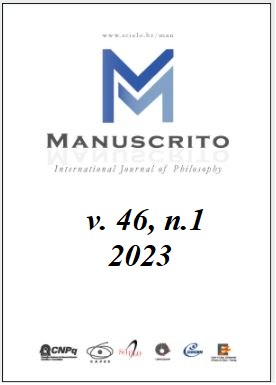Resumen
En este trabajo se defiende una interpretación constructivista de la Crítica de la razón pura, que se construye por analogía con una construcción experimental que Kant considera característica de la química. También defiendo una forma de conciliar la perspectiva metodológica del método constructivista con la de la reflexión trascendental. Por tanto, proporciono una explicación constructiva de lo que Kant describe como razón pura y el argumento de la deducción trascendental. Propongo enmarcar las diferentes perspectivas de tal manera que la construcción experimental sea la ratio cognoscendi de la razón pura, mientras que la razón pura sea la ratio essendi de la construcción experimental. O'Neill (1989, 2015) es uno de los estudiosos más importantes que han defendido una lectura constructivista de la Crítica de la razón pura (CPR). En este trabajo desarrollo y exploro nuevos aspectos de esta línea interpretativa. Una de las principales críticas planteadas contra las lecturas constructivistas de la filosofía de Kant es un supuesto compromiso con el subjetivismo o el voluntarismo (cf. Kleingeld & Willaschek 2019). Esta preocupación llevó a algunos estudiosos a renombrar su posición como constitutivista en su lugar (Korsgaard 2009; Sensen 2013, 2017; Formosa 2011). El constitutivismo, pretende ser una especie de constructivismo capaz de evitar el voluntarismo. Sin embargo, a veces resulta difícil diferenciar entre las posiciones constitutivistas y fundacionalistas, que se basan en la reflexión trascendental e implican una especie de perspectiva realista.
Citas
Bacon, Francis (2000): The New Organon. Cambridge texts in the history of philosophy. Cambridge.
Formosa, Paul (2011): Is Kant a Moral Constructivist or a Moral Realist?, in: European Journal of Philosophy 19(3), pp.1-27.
Förster, Eckart (ed.) (1989): Kant’s Transcendental Deductions, Stanford.
Gloy, Karen (1996): Kants Philosophie und das Experiment, in: Schönrich, Gerhard; and Kato, Yasushi (Hrsg.) Kant in der Diskussion der Moderne, Frakfurt am Main.
Henrich, Dieter (1966): Zu Kants Begriff der Philosophie, In: Kaulbach, Friedrich; ritter, Joachim (Eds.). Kritik und Metaphysik (Festschrift für Heinz Heimsoeth), Berlin, pp. 40-59.
_____. (1969): The Proof-Structure of Kant's Transcendental Deduction, in: The Review of Metaphysics, 22(4), pp. 640-659.
_____. (1975): Die Deduktion des Sittengesetztes, in: Schwan, A (Org.). Denken im Schatten des Nihilismus. Festschrift für Wilhelm Weischedel zum 70. Geburststag. Darmstadt.
_____. (1984): Die Beweisstruktur der transzendentalen Deduktion der reinen Verstandesbegriffe, in: Tuschling, B. (Org.). Probleme der 'Kritik der reinen Vernunft'. Kant-Tagung Marburg 1981, Berlin.
_____. (1989): Kant’s Notion of a deduction and the Methodological Background of the First Critique, in: Förster, Eckart (ed.). Kant's Transcendental Deductions. Stanford.
_____. (2001): Systemform und Abschlussgedanke. Methode und Metaphysik als Problem in Kants Denken, in: Gerhardt, V. (Orgs.). Kant und die Berliner Aufklärung, Berlin.
Höffe, Otfried (2003): Kants Kritik der reinen Vernunft. Die Grundlegung der Moderne Philosophie. München.
Kaulbach, Friedrich (1978): Das Prinzip Handlung in der Philosophie Kants. Berlin.
Klein, T. Joel (2020): Systematic perspectives on the distinction between appearances and things in themselves in the Critique of Pure Reason, in: Studia Kantiana, v. 18, p. 139-175.
_____. (2019): Ciência e Método em Bacon e Kant, in: Revista Dissertatio de Filosofia, v. 49, p. 287-311.
Kleingeld, Pauline & Willascheck, Marcus (2019): Autonomy without Paradox: Kant, Self-Legislation and the Moral Law, in: Philosophers’s Imprint v.19, n.6, pp.1-18.
Korsgaard, Christine M. (1996): Creating the Kingdom of Ends, Cambridge.
_____. (1996b): The Sources of Normativity, Cambridge.
_____. (2009): Self-Constitution: Agency, Identity, and Integrity, Oxford.
Møller, S. (2020). Kant's Tribunal of Reason: Legal Metaphor and Normativity in the Critique of Pure Reason. Cambridge University Press.
O’Neill, Onora, (1989): Constructions of Reason, Cambridge University Press.
_____. (2015): Constructing Authorities, Cambridge University Press.
Pievatolo, Maria Chiara (1999): The Tribunal of Reason: Kant and the Juridical Nature of Pure Reason, in: Ratio Juris, 12, pp. 311-327.
Proops, Ian (2003): Kant's Legal Metaphor and the Nature of a Deduction, in: Journal of the History of Philosophy, 41 (2), pp. 209-229.
Rawls, John (1980): Kantian Constructivism in Moral Theory, in: Journal of Philosophy 77, pp. 515-72. Reprinted in Rawls 1999b, pp.303-58.
Rawls, John (1989): Themes in Kant’s Moral Philosophy, in: Förster (ed.): 81-113. Reprinted in Rawls 1999, pp. 497-528.
_____. (1996): Political Liberalism, rev. ed., New York.
_____. (1999a): A Theory of Justice, rev. 2nd., Oxford.
_____. (1999b): Collected Papers, ed. S. Freeman, Cambridge, MA: Harvard.
Reath, Andrews (2006): Agency and Autonomy in Kant’s Moral Theory: Selected Essays. Oxford.
Schafer, Karl (2019): Kant: Constitutivism as capacities-first philosophy, in. Philosophical explorations. DOI: 10.1080/13869795.2019.1599049
Seeberg, Ulrich (2007): Kants Vernunftkritik als Gerichtsprozeß. In: Bowman, B. (Org.). Darstellung und Erkenntnis. Paderborn.
Sensen, Oliver (2013): Kant's Constructisivm, in: Bagnoli, Carla (ed.): Constructivism in Ethics, Cambridge University Press, pp. 63-81.
_____. (2017): Kant's Constitutivism, in: E. Schmidt and R. dos Santos (eds.), Realism and Antirealism in Kant's Moral Philosophy (New Essays), Berlin, pp. 197-220.
_____. (2013): Moral Skepticism, Constructivism, and the Value of Humanity, in: Carla Bagnoli (ed.), Constructivism in Ethics (Cambridge: Cambridge University Press), pp. 22-41.
Trevisan, Diego K. (2018): Der Gerichtshof der Vernunft: Eine historische und systematische Untersuchung über die juridischen Metaphern der Kritik der reinen Vernunft. Würzburg.
Wind, Edgar (2001): Das experiment und die Metaphysik, Frakfurt am Main.

Esta obra está bajo una licencia internacional Creative Commons Atribución-NoComercial 4.0.
Derechos de autor 2023 Manuscrito: Revista Internacional de Filosofía


